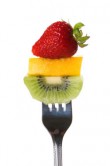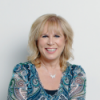3 Simple Kitchen Tools to Bust That Plateau

Then we tell ourselves we're not really eating THAT much.
And then? Then, we wonder why we're either gaining weight or stuck in a plateau.
The truth is, if you've never measured out your food, you have no clue how much you're eating.
If you're going to count calories -- and make it work -- guesstimating won't cut it. In fact, it might even be one of the reasons why you're having trouble losing weight.
When you track your calories with FitWatch Calorie Tracker, measuring out your food will help you to understand how much you're eating.
Let me show you three simple kitchen tools to help you become a calorie counting guru. You probably even have the first two in your kitchen. But do you use them when it comes to counting your calories? Ah, that's the question!
1. Measuring Spoons There’s really no excuse for not having these in the house and using them. You can get them cheap at a dollar store. They usually come in a set of six ‘spoons’, ranging in size from ⅛ tsp (.5ml) to 1 tbsp. (15ml).
If you don’t like to wash up often, get yourself a few sets that you can use throughout the day.
Use the measuring spoons to measure out foods like olive oil, salad dressings, mayo, barbecue sauce, coffee creamer, peanut butter, butter, cream cheese -- any kind of condiment or food item that is small, basically.
These little sauces or dressings that you add to your food can pack quite a wallop in the calorie department. And this could be a source of hidden calories that’s making you gain weight or keeping you forever stuck on that plateau.
Like I said, you can pick up a cheap set at the dollar store or head on over to your favorite kitchen supply store. Amazon has a variety of measuring spoons
2. Measuring Cups Pop quiz! When is a glass not a glass? When it’s 8oz.
As with the measuring spoons, there’s no excuse for not having these in the house when you can get a cheap set at the dollar store.
Drinking a ‘glass’ of milk, for example, does not mean you grab a glass, fill it up and drink. If you really want to know how much you’re drinking, you need to measure it out. If you use the same glass all the time, note the level of the liquid so you can eventually eyeball a portion or serving.
See: How Many Glasses of Wine Are You REALLY Drinking?
You can buy a simple set of 4 nested measuring cups with ¼, ⅓ , ½ and 1 cup measures. Or go for a 6 piece stainless steel set
Not only can you measure out liquids, but you can measure out any foods that come in “cup” servings like spaghetti, rice, beans, vegetables, soups and stews.
See: 7 Things You Need to Know About Serving Sizes
3. Food Scale (Nutrition Scale) While there are tips for eyeballing certain food portions, if you really want to count calories like a pro and bust that plateau, a food scale is the way to go.
I use mine to measure out portions of meat -- 3oz to 4oz is a regular serving of meat, wouldn’t you know --or for any kind of food where a ‘weight’ measure is important.
Take a banana, for example. A large banana has more calories than a small banana, right? But if you count the calories in ‘1 banana’, are you talking 89 calories in a small banana or 134 calories in a large banana?
Being 44 calories off on its own is no big deal. But add 44 extra calories here, 75 extra calories there and before you know it, you’re eating enough extra calories a day to stall all of your weight loss efforts.
Contrary to popular belief, calories DO count.
There are two different types of scales to consider:
- a food scale, which only weighs your food;
- a nutrition scale, which will calculate the amount of calories of the food being weighed (among other things).
A simple, digital food scale
Nutrition scales are more expensive and can cost anywhere between $30 to $80+. GoWISE
Whichever way (weigh?!) you go, get a scale that has a digital read out.
Think size and style, too. You’ll be leaving it out on the counter or a kitchen island, so get something that suits your style.
Do I Have to Measure My Food Forever?
Measuring out your food can take a few extra minutes out of your day -- and you’re probably already busy enough, right? The beauty of making the effort to measure out your food is that you learn what a proper portion or serving is, plus you add the skill of being able to eyeball your servings.
Once you’ve acquired the eyeballing skill, you could stop measuring out your food, if you really want to. But there is one major drawback: you run the risk of your portion sizes slowly growing bigger. If you find yourself in a position where the weight is creeping back or you’re stuck in a plateau again, get out the measuring spoons, measuring cups and scale to help recalibrate your ‘eyeballing’ skills and get yourself back on track.
What about you? Do you measure out your food? Do you use a food scale? Are you stuck in a plateau?
Want to learn how to count calories? Sign up for my free 28 Day Calorie Counting Boot Camp.
Help Keep FitWatch Free: If you buy anything through Amazon using the links up above (whether it’s the products mentioned or anything else), FitWatch receives a small commission. This helps keep FitWatch free for everyone!
using the links up above (whether it’s the products mentioned or anything else), FitWatch receives a small commission. This helps keep FitWatch free for everyone!
Must Read
Six Serving Sizes You Need to Get Right To Lose Weight
Portion Size: How Much Is Enough?



